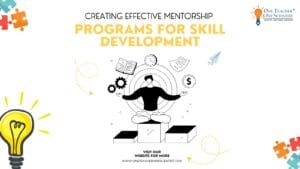In today’s rapidly evolving world, learning isn’t confined to traditional classrooms anymore. To thrive in a globalized, technology-driven environment, students need skills that go beyond memorizing information. They need mentorship—guidance from experienced individuals who can offer real-world insights, practical skills, and emotional support. This is where mentorship emerges as a key pillar of 21st-century learning.
W dive into the profound impact mentorship has on modern education, the essential skills it cultivates, and why mentorship is essential for 21st-century skill development.
Need for Mentorship in 21st-Century Learning
Mentorship provides a unique, personalized learning experience that complements conventional education. By working with mentors, students gain tailored guidance that nurtures their strengths, helps them overcome challenges, and inspires their growth. In the 21st century, where adaptability, creativity, and resilience are highly valued, mentorship empowers students to go beyond the limitations of a standardized curriculum.
Mentorship also promotes soft skills—qualities like emotional intelligence, problem-solving, and communication—which are essential for navigating the complexities of the modern workforce. With mentorship, students develop both the knowledge and confidence to transition from academic life to career success.

Key 21st-Century Skills Developed Through Mentorship
Mentorship is a catalyst for a wide range of competencies needed in today’s world. Here’s how mentorship fosters these critical 21st-century skills:
- Critical Thinking and Problem Solving
In a world filled with information, the ability to think critically and make informed decisions is invaluable. Mentors encourage students to analyze problems, consider various perspectives, and develop creative solutions. This experience goes beyond rote learning, giving students the tools to approach challenges thoughtfully and independently.
- Communication and Collaboration
Mentorship provides students with opportunities to practice and refine their communication skills, a must-have for modern workplaces. Whether through discussing ideas, sharing feedback, or working together on projects, mentees learn to articulate their thoughts clearly and to work well with others—qualities that employers highly value.
- Adaptability and Resilience
The modern world is characterized by constant change. Mentors help students understand and manage this reality by sharing personal stories, challenges, and strategies for resilience. This experience fosters a growth mindset, encouraging students to view setbacks as learning opportunities, rather than failures.
- Emotional Intelligence and Self-Awareness
Mentors play a crucial role in building *emotional intelligence* (EQ). They guide students in identifying their strengths, setting realistic goals, and managing emotions. EQ is recognized as a key factor for success, influencing everything from relationships to leadership abilities. Through mentorship, students learn to navigate social dynamics with empathy and self-awareness.
- Career-Oriented Skills and Goal Setting
Mentorship provides insights into industry trends, networking, and goal setting. Mentors help students identify their passions, explore career paths, and develop the skills needed to achieve long-term success. This guidance is invaluable in preparing students for the realities of professional life and equipping them to pursue their aspirations.
The Role of Technology in Modern Mentorship
Advancements in technology have made mentorship more accessible than ever before. Digital mentorship platforms, online collaboration tools, and virtual meeting spaces enable mentors and mentees to connect from any location, breaking down geographical barriers. Here’s how technology enhances mentorship in 21st-century learning:
- Virtual Mentorship Platforms: Online platforms connect students with mentors worldwide, giving them access to diverse perspectives and experiences.
- Digital Communication Tools: Tools like Zoom, Google Meet, and Slack foster continuous communication, making mentorship more flexible and interactive.
- Data-Driven Insights: Mentorship programs equipped with analytics provide mentors with data on student progress, allowing for more tailored and effective guidance.
Through these technological advancements, mentorship in education has become more adaptable, inclusive, and responsive to the individual needs of students.

Creating Effective Mentorship Programs for Skill Development
To unlock the full potential of mentorship, programs must be well-structured, with clear objectives and strategic planning. Here are essential elements to consider when designing mentorship initiatives:
- Set Clear Goals
Effective mentorship begins with clearly defined goals. Whether focused on academic support, personal growth, or career guidance, clear objectives keep both mentors and mentees aligned, ensuring purposeful engagement throughout the mentorship journey.
- Match Mentors and Mentees Thoughtfully
The effectiveness of mentorship often depends on the mentor-mentee relationship. When pairing mentors and mentees, consider factors like shared interests, background, and career goals. The right match can create a more impactful and productive mentorship experience.
- Promote Consistent Interaction
For mentorship to be truly effective, regular communication is essential. Encourage mentors and mentees to meet frequently, set agendas, and engage in meaningful conversations. Consistency fosters trust and accountability, helping both parties achieve their goals.
- Provide Mentors with Resources and Training
Not all mentors have experience guiding students. Providing mentors with resources, training, and tools for effective mentorship practices can make a significant difference. Training programs can include communication skills, goal setting, and strategies for fostering personal growth.
- Gather Feedback and Adapt
Continuous evaluation helps improve mentorship programs over time. Regular feedback from both mentors and mentees allows coordinators to make adjustments that enhance program effectiveness. Recognizing successful practices also provides a roadmap for scaling mentorship initiatives across broader educational settings.
Conclusion: Mentorship as a Pathway to 21st-Century Skill Development
Mentorship is more than guidance; it’s a transformative experience that prepares students for a successful future. By fostering critical skills like emotional intelligence, adaptability, and problem-solving, mentorship equips students with the tools they need to navigate the modern world.
As the demand for 21st-century skills continues to rise, mentorship will remain a vital component of education, complementing traditional learning methods. For educators, students, and institutions alike, investing in mentorship is a powerful step toward building a generation of resilient, empowered, and future-ready individuals.
Mentorship is more than an educational tool—it’s a catalyst for change in the way we approach learning, development, and success in the 21st century.


